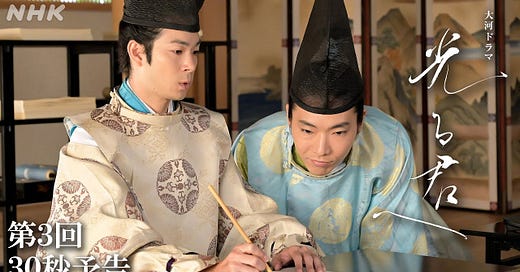孟子曰、「人皆有不忍人之心(孟子曰わく、人皆、人に忍びざるの心あり)」
I think in all cultures, there is a tradition of a ruler sneaking out of the castle to walk among his people in the streets. Disguised as a common citizen, these kings and princes seek to know the heart of the people. To feel the pulse of the world.
Watching the young Michinaga in his commoner clothing, I was reminded of Peter the Great’s trek across Europe—well, except he didn’t really fool anyone, causing so much trouble for people along the way, who had to pretend that they had no idea who he was, but still grovel and clean up after him!
From childhood, Michinaga in the drama has loved throwing off the clothes of an aristocrat and mingle among the people. Michinaga’s power-hungry father derides his son for caring about the people. The ruthless pursuit of power is what is at issue, his father tells him.
“If you spend time trying to understand the common people, you will never be able to rule them”
He uses the word, 祭り事 “matsuri.” We think of matsuri in terms of festivals and rites, but in ancient times, political rule and performing the rites were one and the same. And it was another way of indicating government and governing.
古代に置いて祭政一致であったことから転じて、政治の古い言い方。
Right after this scene with his father, the aristocratic young men are shown studying the classics with their teacher, when Mencius is brought up. Specifically, this quote from the Mencius is brought forward for study:
“All people have the heart of bu ren.” 孟子曰、「人皆有不忍人之心
不忍 bu ren means something like
1. “the heart/mind that is unable to bear the suffering of others” OR
2. “the heart/mind that is unable to bear harming others.
Or is it an “or”? Maybe sins of omission and sins of commission were not different things in ancient Chinese thought?
In any case, all human beings have this capacity but it was categorically required in ancient kings, being something that all rulers were required to possess. Indeed, it is the one necessary requirement—to understand and care for the suffering of the people is all that is truly needed.
In my favorite book on Confucian philosophy, Thinking Through Confucius, by Hall and Ames, the importance of the common people (min 民) is shown to play a critical role in manifesting the will of Tian 天 (heaven) and the acceptance of a proposed ruler. “Heaven sees as the people see. Heaven hears as the people hear.”
And so, perhaps the Michinaga of the drama is wise indeed to walk among them.
In the scene, it was wonderful to see Fujiwara no Kinto close his text and recite the words of Mencius from memory in that exquisite recitation. The aristos certainly internalized, knowing by heart, the Chinese classics.
For Maya: 【光る君へ】黒木華など新登場人物続出!はんにゃ金田も…|NHK大河ドラマ・モノマネ撮って出し「第3回 謎の男」【権力争い】(he is wearing a tee-shirt of his latest book cover)





I was waiting until I’d seen the episode to read your take on it! Thank you for the link, does that guy get special access ahead of time to the entire series? I’m so tempted to get his book for the Taiga from year before last, it’s Kamakura era and there was some great magical realism that I wish I understood better.
I also wanted to say, I have to watch each episode twice! I don’t always understand what is happening!
So true! I just started writing a sketch with one of the main characters "The Man on the Street" with this very idea in mind! However, tangentially related to your discussion of the definition(s) of bu ren -- the "or" of harm -- the problem I faced is this: Do I name the character "The Man in the Street" or "The Man on the Street"? The preposition "on" or "in" can bring to mind the contemporary association of a homeless person living in the streets -- or "on" the streets. And I want the imaginative association to be the one of prince-to-be-king without the obvious give-it-away descriptions of grandeur and wealth. (FWIW the other two characters in the sketch are The Woman from the Sea and The Third Eye of the Tree. I take humor seriously!). Thanks for reading this,Leanne. And The Man in/on the Street is curious if you have an opinion? This is, obviously, a powerful character and both meanings of bu ren must live by the heart of the man.